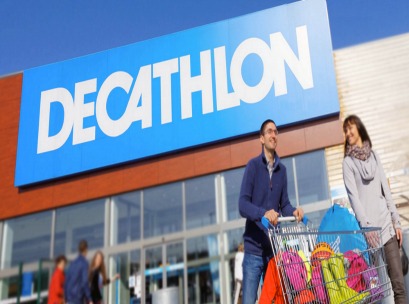Super Retail Group and Sportspower have downplayed the impact the impending arrival of French sports retail giant, Decathlon, on our shores could have on Australia’s leading sports retail chains. Decathlon, a large format retailer that offers equipment and clothing for 75 sports and boasts more than 1000 stores worldwide, has earmarked expansion into Australia and has had executives on the ground in Sydney since October last year. Decathlon will launch a local Australian e-commerce website thi
s month, after the targeted March launch of the site was delayed due to technical issue.
Colliers International’s large format retail team is understood to be presenting leasing options to Decathlon, which is said to be targeting 35 to 40 Australian stores over the next decade. The French company is said to have identified four large format locations in Sydney – three in greater western Sydney and one in the city’s inner west – and two in Melbourne.
Decathlon predominantly stock private label brands; it is a vertically integrated business that designs the vast majority of its products in-house. As well as sports, Decathlon also stocks a camping goods range.
Sylvain Baudens, CFO of Decathlon Australia and charged with business development in Australia, has been working with the Large Format Retail Association since late last year. Baudens declined to comment to Inside Retail Weekly, but Philippa Kelly, CEO of the LFRA, said Decathlon is the first retailer the LFRA has accepted as a member without having any existing stores.
“There’s no doubt about the fact that they’re a competitor in the marketplace,” Kelly said. “They’re here, they’re parked in. And they’ve done it before – they’ve rolled out in countries where they didn’t have anything in before. It’s great to have them part of the LFRA team and it’s good for our sector. They’re not going to be the Nike and Asics of this world; they’ve got their own labels. But so does Uniqlo. H&M sells H&M, Forever 21 sells Forever 21.”
Terry Dopper, who as GM of sport for Associated Retailers Limited overseas the Sportspower chain, said Decathlon’s focus on private labels may make it hard for it to gain initial traction in Australia.
“They haven’t got much in the way of world brands at all, so they drive their business through their own labels, which is interesting,” he said. “If [Decathlon] is 90 per cent home brand, I don’t know how it’s going to cut the mustard here. The population that will go down the home brand path is not big enough. I think they’ll probably affect more of a Target or Kmart-type operation, with pseudo-sporting and apparel and footwear.”
Super Retail Group’s Erica Berchtold, who runs the group’s Rebel Sport and Amart Sport chains, also downplayed the Decathlon threat. She said the French brand would more likely compete directly with Amart than Rebel.
“Decathlon’s own PR declarations have highlighted the differences between their business and what our proposition is,” Berchtold said. “They are mainly home brand products and their store locations are very different to Rebel. They don’t want shopping centre locations. And given they want 2000 to 4000 square metres, I don’t know where those stores will be in the vicinity of Amart.
“They call it brands that haven’t been seen in Australia before, but really what that is is home brands – it’s their own brand or private brand. The private label stuff is very different to Amart as well. It’s different – they’ve been touted as the Aldi of sporting retail business. And what Aldi offers customers is very different to what Coles or Woolworths offer customers.”
Gayle Dickerson, national head of retail at Grant Thornton Australia noted that Decathlon’s impending arrival is a reflection of international retailers’ appetite for the Australian market.
“International operators intensify competition but also encourage our local retailers to be innovative in distinguish their offering, creating an opportunity for mid-size retailers to differentiate themselves,” Dickerson said. “Decathlon seems to be predominantly a private label brand overseas, so it will remain to be seen how Australian consumers engage with the relatively unknown brand. It may be that its main competition will be with the private brands at the department stores, rather than independent sports retailers.”
Paddy Carney, a partner at PwC Australia, added that Decathlon will need to be clear on its point of difference in a crowded market.
“It’s difficult to translate retail concepts across borders – how the offer is tailored for the Australian market will be fundamental to its success.”
Access exclusive analysis, locked news and reports with Inside Retail Weekly. Subscribe today and get our premium print publication delivered to your door every week.

